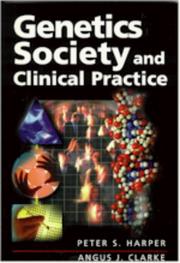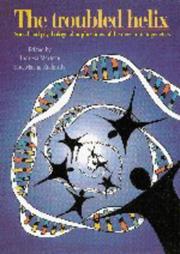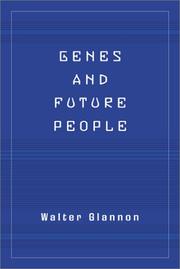| Listing 1 - 10 of 28 | << page >> |
Sort by
|
Book

ISBN: 9070713365 Year: 1998 Publisher: Nijmegen Katholiek studiecentrum
Abstract | Keywords | Export | Availability | Bookmark
 Loading...
Loading...Choose an application
- Reference Manager
- EndNote
- RefWorks (Direct export to RefWorks)

ISBN: 1859962068 Year: 1997 Publisher: Oxford BIOS scientific publ.
Abstract | Keywords | Export | Availability | Bookmark
 Loading...
Loading...Choose an application
- Reference Manager
- EndNote
- RefWorks (Direct export to RefWorks)
This volume examines, from both ethical and clinical perspectives, the impact of increasing genetic knowledge on individuals and families. The authors use their experience of working within clinical genetics to describe the social implications arising from the ability to test for an increasing number of genetic diseases. Current controversial issues are described. Several chapters are based on lead articles and editorials the authors have been asked to write for "The Lancet" and the "British Medical Journal". The book provides an introduction to the effects on individuals of the practical issues associated with genetic testing and should, therefore, be of interest to all those involved in clinical genetics.
genetische test --- genetische screening --- neonatale screening --- prenatale diagnostiek (prenatale test) --- genetische counseling --- #GBIB:CBMER --- test génétique --- dépistage génétique --- dépistage néonatal --- diagnostic prénatal (test prénatal, DPN) --- conseil génétique
Book
ISBN: 9052601593 Year: 2004 Publisher: Amsterdam Aksant
Abstract | Keywords | Export | Availability | Bookmark
 Loading...
Loading...Choose an application
- Reference Manager
- EndNote
- RefWorks (Direct export to RefWorks)
#GBIB:CBMER --- genetische test --- prenatale diagnostiek (prenatale test) --- genetische screening --- test génétique --- diagnostic prénatal (test prénatal, DPN) --- dépistage génétique --- Human genetics

ISBN: 0521586127 0521462886 9780521462884 Year: 1996 Publisher: Cambridge Cambridge University Press
Abstract | Keywords | Export | Availability | Bookmark
 Loading...
Loading...Choose an application
- Reference Manager
- EndNote
- RefWorks (Direct export to RefWorks)
This wide ranging and compelling account surveys the exciting opportunities and difficult problems which arise from the new human genetics. The availability of increasingly sophisticated information on our genetic make-up presents individuals, and society as a whole, with difficult decisions. Although it is hoped that these advances will ultimately lead the way to the effective treatment and screening for all diseases with a genetic component, at present many individuals are 'condemned' to a life sentence, in the knowledge that they, or their children, will suffer from an incurable genetic disease. This is the first book to attempt to explore and survey these issues from such a variety of perspectives: from personal accounts of individuals coping with the threat of genetic disease, from the viewpoint of clinicians and scientists, and from those concerned with psychosocial, legal and ethical aspects.
Medical genetics --- Génétique médicale --- Social aspects --- Moral and ethical aspects --- Aspect social --- Aspect moral --- Moral and ethical aspects. --- Social aspects. --- genetica (genen) --- genetische ziekten --- genetische counseling --- prenatale diagnostiek (prenatale test) --- kinderen --- predictieve genetische test (voorspellende genetische test) --- psychologie (psychologische aspecten) --- ethiek (ethische aspecten) --- génétique (gènes) --- maladies génétiques --- conseil génétique --- diagnostic prénatal (test prénatal, DPN) --- enfants --- test génétique prédictif --- psychologie (aspects psychologiques) --- ethique (aspects ethiques) --- Génétique médicale --- Medical genetics - Social aspects --- Medical genetics - Moral and ethical aspects

ISBN: 0754620557 Year: 2005 Publisher: Aldershot Ashgate
Abstract | Keywords | Export | Availability | Bookmark
 Loading...
Loading...Choose an application
- Reference Manager
- EndNote
- RefWorks (Direct export to RefWorks)
Genetics and Gene Therapy shows the wide range of the debate and the very real significance that genetics and its associated developments have for human beings, individually and collectively. Few areas of science and medicine have resulted in the volume of academic and popular literature as has genetics. The so-called revolution in understanding of the causes of disease states, and even behavioural traits, has focussed public attention on the influence of genes in making us what we are. Rapidly, however, the potential benefits of such understanding were overtaken, in the public mind at least, by the question of the possible (negative) implications of genetic knowledge and associated technologies. The chapters in this volume show just how wide-ranging concern has become, ranging from regulation to cloning, with the fear of discrimination in between. Part One begins with a range of general discussions of about the genetic enterprise itself, followed by consideration of some specific questions. Part Two then addresses cutting edge debates in genetics.
genetica (genen) --- gentherapie --- predictieve genetische test (voorspellende genetische test) --- stamcellen --- pre-implantatie genetische diagnose (PGD) --- kloneren (klonen, therapeutisch kloneren, reproductief kloneren) --- genetische discriminatie --- menselijk genoom --- persoonlijke levenssfeer (privacy, bescherming van de persoonlijke levenssfeer, anonimiteit) --- farmacogenetica --- génétique (gènes) --- thérapie génique --- test génétique prédictif --- cellules souches --- diagnostique génétique pré-implantatoire (DPI, diagnostic préimplantatoire) --- clonage (clonage thérapeutique, clonage reproductif) --- discrimination génétique --- génome humain --- vie privée (protection de la vie privée, anonymat) --- pharmacogénétique --- Gene therapy --- Medical genetics --- Therapy, Gene --- Genetic engineering --- Therapeutics --- Moral and ethical aspects
Book
ISBN: 9020956604 9789020956603 Year: 2005 Publisher: Leuven LannooCampus
Abstract | Keywords | Export | Availability | Bookmark
 Loading...
Loading...Choose an application
- Reference Manager
- EndNote
- RefWorks (Direct export to RefWorks)
Tal van erfelijke aandoeningen kunnen, lang voor er symptomen zijn, opgespoord worden via een genetische test, meer bepaald via DNA-onderzoek. In vakkringen spreekt men van ‘predictieve’ (voorspellende/voorzeggende/waarschuwende) tests. Een stijgend aantal mensen doet een beroep op de genetische centra voor een erfelijkheidsraadpleging en/of een genetische test. Ze maken zich zorgen dat ze later misschien de ziekte kunnen krijgen die een of meerdere familieleden heeft. Een predictieve test biedt soms de mogelijkheid om hun eigen toekomst te kennen, althans wat die ziekte betreft. De test gaat na of een symptoomloos persoon een mutatie heeft die zeker of met een hoge kans leidt tot een erfelijke ziekte later in het leven. Personen met die mutatie zijn dus nog geen 'patiënten'. Sommige onder hen zullen zelfs nooit de aandoening krijgen. De persoonlijke beslissing om een predictieve test te laten uitvoeren is vaak een heel moeilijk proces. Dit is vooral zo als er geen behandeling of preventie voor de ziekte bestaat of alleen door ingrijpende maatregelen, zoals preventieve chirurgie. Slechts één vijfde van de mogelijke dragers van een erfelijke aandoening laat zich testen. Bij de tachtig procent die zich niet laat testen zijn er zeker velen die liever niet weten of ze later al dan niet ziek zullen worden. Over de mogelijkheden en beperkingen van genetisch testen en de psychologische, familiale, maatschappelijke en ethische implicaties ervan zijn niet alleen de potentiële aanvragers van deze tests, maar ook vele professionelen in de gezondheidszorg onvoldoende op de hoogte. Toch is er behoefte aan meer informatie. Met dit boek willen de auteurs, werkzaam aan de K.U.Leuven en/of het UZ te Leuven, hieraan tegemoet komen. Tot slot inventariseren ze de mogelijkheden en beperkingen van predictieve genetische tests voor een aantal andere neurodegeneratieve aandoeningen resp. erfelijke kankers. Ook recent beschikbare mogelijkheden met betrekking tot erfelijke hartaandoeningen, meer bepaald erfelijke hartritmestoornissen, passeren de revue. Het werk bevat een aantal nuttige bijlagen: een adressenlijst van genetische centra in België en Nederland en een uitgebreide verklarende woordenlijst. Het boek is vooral geschreven voor beroepsgroepen die op een of andere manier betrokken kunnen worden bij predictief genetisch testen: huisartsen, verpleegkundigen en andere professionelen uit de gezondheidszorg maar ook juristen, ethici en beleidsverantwoordelijken. De toegankelijkheid voor patiënten en families met erfelijke aandoeningen is naar mijn mening beperkt. Het gaat immers over een onderzoeksverslag. Gelukkig zijn er vele persoonlijke getuigenissen opgenomen. Zij kozen voor twee soorten erfelijke aandoeningen. De ziekte van Huntington staat model voor het testen op neurodegeneratieve aandoeningen die meestal op volwassen leeftijd optreden en waarvoor nog geen afdoende behandeling bestaat. De erfelijke vorm van borst- en eierstokkanker wordt gebruikt als uitgangspunt voor een aantal andere erfelijke kankers. Dragers van de mutatie voor erfelijke borst- en eierstokkanker kunnen wel preventieve, zij het ingrijpende, maatregelen nemen. Voor iedere aandoening belichten ze eerst welke soorten predictieve genetische tests kunnen uitgevoerd worden en hoe dit in de praktijk verloopt. De procedure is uitgebreid en gebeurt altijd in een multidisciplinair kader. Zij hebben ook een ruime groep huisartsen, verpleegkundigen en vroedvrouwen, patiëntenorganisaties en onderzoekers in de biotechnologie bevraagd over de wenselijkheid van genetische testen. De auteurs besteden naar verhouding echter veel ruimte aan de uitkomsten van deze bevraging en te weinig aan conclusies, bijvoorbeeld in verband met sensibilisering van de bevolking.
Genetic Testing --- Genetic Predisposition to Disease. --- Academic collection --- C6 --- genetica --- predictieve genetische test (voorspellende genetische test) --- erfelijkheid (erfelijke aanleg) --- 600.2 --- 605.99 --- aangeboren afwijkingen --- borstkanker --- chorea van Huntington --- eierstokkanker --- erfelijkheidsleer --- geneeskunde --- genetische afwijkingen --- gezondheidszorg --- predictieve genetische test --- 599.2 --- chorea van Huntington (Huntington) --- erfelijke ziekten --- genetisch advies --- genetisch risico --- ovariumcarcinoom --- prenatale diagnose --- Erfelijkheidsleer --- Genetica --- Genetisch onderzoek: ethiek --- Genetisch onderzoek: sociale aspecten --- Predisposition, Genetic --- Susceptibility, Genetic --- Genetic Predisposition --- Genetic Susceptibility --- Genetic Predispositions --- Genetic Susceptibilities --- Predispositions, Genetic --- Susceptibilities, Genetic --- Disease Susceptibility --- Anticipation, Genetic --- Genetic Association Studies --- Gene-Environment Interaction --- methods. --- Opvoeding, onderwijs, wetenschap --- test génétique prédictif --- hérédité (disposition héréditaire, prédisposition héréditaire) --- Andere speciale ziekten - Genetologie - Aangeboren en erfelijke afwijkingen - Chronische ziekten --- (zie ook: gynecologie) --- (zie ook: genetisch advies) --- genetics --- Molecular biology --- tests --- medische genetica --- Genetisch onderzoek ; ethiek --- Borstkanker --- Ziekte van Huntington --- Genetic Predisposition to Disease --- methods --- Gezondheidszorg --- Ziekte --- Erfelijkheid --- Psychosociale problemen --- Provincie West-Vlaanderen --- Psychosociaal probleem --- Onderzoek --- Ontwikkeling --- Leerlijn

ISBN: 904200696X 9004433589 Year: 1999 Volume: 83 Publisher: Amsterdam ; Atlanta, Georgia : Rodopi,
Abstract | Keywords | Export | Availability | Bookmark
 Loading...
Loading...Choose an application
- Reference Manager
- EndNote
- RefWorks (Direct export to RefWorks)
Most public discussion has focused on those effects of genetic research that are considered in some way unwanted or unpleasant. For example, there has been much debate concerning the risks and the ethical appropriateness of genetic screening, gene therapy, and agricultural applications based on genetic techniques. It often claimed that genetic research may cause new problems such as genetic discrimination, stigmatization, environmental risks, or mistreatment of animals. Genes and Morality: New Essays adopts a critical attitude toward genetic research, on both a theoretical and a practical level. It presents some of the most important problems in the ethics of genetic engineering, including the questions of genetic health and disease, genetic testing, responsibility for health, patenting non-human and human life, and problems related to the disclosure of genetic information. The aim of the book is to focus on real ethical and conceptual issues. Consider, for instance, the concept of genetic disease. As one of the contributors, Ingmar Prn, writes, fear of genetic disease, or anxiety, is not itself a disease any more than fear of becoming unemployed is a disease. Alleviating such emotions is not a medical task to be discharged by drug therapy. The book also examines the philosophical foundations of these issues by discussing the most influential bioethical theories of today, including utilitarianism and principlism.
Genetic engineering --- Génie génétique --- Moral and ethical aspects --- Aspect moral --- #GBIB:CBMER --- genetische engineering (manipulatie) --- menselijk genoom --- patent (octrooi, patentrecht, octrooirecht, biopatent) --- genetische test --- génie génétique (ingénierie génétique) --- génome humain --- brevet (brevetabilité, brevetabilité biologique, droit de brevet, droit des brevets, brevetabilité du vivant) --- test génétique --- Génie génétique --- Eugenics --- Homiculture --- Race improvement --- Euthenics --- Heredity --- Involuntary sterilization --- Moral and ethical aspects.

ISBN: 0813365600 0813365767 Year: 2001 Publisher: Cambridge Westview
Abstract | Keywords | Export | Availability | Bookmark
 Loading...
Loading...Choose an application
- Reference Manager
- EndNote
- RefWorks (Direct export to RefWorks)
Advances in genetic technology in general and medical genetics in particular will enable us to intervene in the process of human biological development which extends from zygotes and embryos to people. This will allow us to control to a great extent the identities and the length and quality of the lives of people who already exist, as well as those we bring into existence in the near and distant future. Genes and Future People explores two general philosophical questions, one metaphysical, the other moral: (1) How do genes, and different forms of genetic intervention (gene therapy, genetic enhancement, presymptomatic genetic testing of adults, genetic testing of preimplantation embryos), affect the identities of the people who already exist and those we bring into existence? and (2) How do these interventions benefit or harm the people we cause to exist in the near future and those who will exist in the distant future by satisfying or defeating their interest in having reasonably long and disease-free lives? Genes and Future People begins by explaining the connection between genes and disease, placing genetic within a framework of evolutionary biology. It then discusses such topics as how genes and genetic intervention influence personal identity, what genetic testing of individuals and the knowledge resulting from it entails about responsibility to others who may be at risk, as well as how gene therapy and genetic enhancement can affect the identities of people and benefit or harm them. Furthermore, it discusses various moral aspects of cloning human beings and body parts. Finally, it explores the metaphysical and moral implications of genetic manipulation of the mechanisms of aging to extend the human life span.The aim Genes and Future People is to move philosophers, bioethicists, and readers in general to reflect on the extent to which genes determine whether we are healthy or diseased, our identities as persons, the quality of our lives, and our moral obligations to future generations of people. The book is a sustained philosophical reflection on some of the metaphysical and moral issues presented by genetics and different forms of genetic intervention.
Human genetics --- Moral and ethical aspects. --- Philosophy. --- genetica (genen) --- genetische test (genetische zelftest) --- kloneren (klonen) --- gentherapie --- génétique (gènes) --- test génétique (autotest génétique) --- clonage --- thérapie génique --- Genetics --- Heredity, Human --- Human biology --- Physical anthropology --- Moral and ethical aspects --- Philosophy --- Moral and religious aspects

ISBN: 0878406786 0878406778 Year: 1998 Publisher: Washington (D.C.) Georgetown university press
Abstract | Keywords | Export | Availability | Bookmark
 Loading...
Loading...Choose an application
- Reference Manager
- EndNote
- RefWorks (Direct export to RefWorks)
Completion of the Human Genome Project will make possible a staggering array of new medical technologies, including new diagnostic and screening tests for inherited disorders, gene therapies, and the ability to manipulate a person's inherited, non-disease traits. This book explores the potential harm to society if we unfairly distribute the enormous benefits of genetic technologies. The resulting division of society into genetic haves and have-nots would undermine the basic foundation of Western democratic society -- the belief in equality of opportunity. This book explains, in terms that can be understood by the general reader, how DNA works, what the Human Genome Project is, what these genetic technologies are and what they promise, and how they could disrupt our democratic society.
Human Genome Project. --- Human genome --- #SBIB:316.334.3M10 --- #SBIB:316.334.3M20 --- #SBIB:003.IO --- menselijk genoom --- genetische test --- genetische screening --- genetische verbetering (maakbare mens) --- DNA --- Genomes --- Human chromosomes --- Medische sociologie: algemeen --- Sociale epidemiologie en etiologie: sociale aspecten van ziekte en gezondheid --- génome humain --- test génétique --- dépistage génétique --- amélioration génétique --- ADN --- Human genome. --- HGP --- H.G.P.

ISBN: 0801858402 Year: 1998 Publisher: Baltimore Johns Hopkins university press
Abstract | Keywords | Export | Availability | Bookmark
 Loading...
Loading...Choose an application
- Reference Manager
- EndNote
- RefWorks (Direct export to RefWorks)
Once a chromosomal defect for Alzheimer's disease is identified, it becomes possible to devise a test for its presence. The implications of such tests are the focus of this volume. Contributors from the fields of ethics, genetics, policy, neurology, philosophy and others discuss the issues.In recent years, scientists have begun to uncover the genetic bases for some forms of Alzheimer's disease. Once a chromosomal defect is identified, it becomes possible to devise a test for its presence. The far-reaching implications of such tests are the focus of this volume. The editors bring together experts from the fields of ethics, genetics, policy, neurology, philosophy and anthropology to examine the ethical and social aspects of genetic testing for Alzheimer's disease. The authors begin by focusing on current genetic findings and their clinical applicability. They then address ethical issues in genetic testing and genetic counselling for Alzheimer's disease. They examine social issues such as confidentiality, discrimination and fairness in health care. Finally, they discuss ways to educate professionals and laypeople regarding these issues.
Alzheimer's disease --- Human chromosome abnormalities --- Alzheimer's Disease --- Diagnosis --- Moral and ethical aspects. --- Social aspects. --- Genetic aspects. --- genetics. --- genetische test --- Alzheimer --- ethiek (ethische aspecten) --- test génétique --- ethique (aspects ethiques) --- Genetics. --- Human chromosomes --- Chromosome abnormalities --- Genetic disorders --- Alzheimer disease --- Alzheimer's dementia --- Basal ganglia --- Presenile dementia --- Senile dementia --- Diagnosis&delete& --- Moral and ethical aspects --- Social aspects --- Genetic aspects --- Abnormalities --- Diseases
| Listing 1 - 10 of 28 | << page >> |
Sort by
|

 Search
Search Feedback
Feedback About
About Help
Help News
News